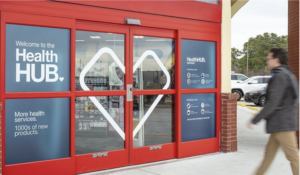
Retailers like CVS Health are aggressively trying to cement their position in healthcare by leveraging several ways to reach the consumer directly, whether in the home or through primary care. One astute observer of the field believes the moves are both offensive and defensive.
The company is seeking to buy Dallas-based Signify Health, a home healthcare tech startup, sources told the Wall Street Journal on Monday. The news comes on the heels of Amazon’s $3.9 billion purchase of primary care company One Medical.

Behavioral Health, Interoperability and eConsent: Meeting the Demands of CMS Final Rule Compliance
In a webinar on April 16 at 1pm ET, Aneesh Chopra will moderate a discussion with executives from DocuSign, Velatura, and behavioral health providers on eConsent, health information exchange and compliance with the CMS Final Rule on interoperability.
Signify uses technology and data to help health plans, employers and providers with in-home care. Its services include in-home health evaluations for Medicare Advantage members and other government health plans. The company has a market value of around $4.7 billion, and multiple suitors — aside from Woonsocket, Rhode Island-based CVS Health — have thrown their hat in the ring, though this doesn’t mean a deal will be consummated.
Signify may not be the only company that CVS Health is looking to acquire. In its second quarter earnings call last week, both CVS Health CEO Karen Lynch and Shawn Guertin, the company’s chief financial officer, stressed the need to pursue deals that fulfill strategic priorities in primary care and home health.
“So we have been very active in evaluating a wide range of assets in and around the care delivery space,” Guertin told Wall Street analysts on the call, per a transcript. “And what I would reiterate is that our priority areas remain primary care provider enablement and home health.”
CVS Health is involved in other areas of healthcare, including providing health insurance with Aetna and urgent care with MinuteClinic as well as owning a pharmacy benefit management company, CVS Caremark. But it doesn’t currently have doctor offices for patients to see a physician. The company first announced it wants to move into primary care in 2021 on investor day. Expanding into home healthcare, virtual care and primary care could make the company a complete end-to-end healthcare provider.

A Deep-dive Into Specialty Pharma
A specialty drug is a class of prescription medications used to treat complex, chronic or rare medical conditions. Although this classification was originally intended to define the treatment of rare, also termed “orphan” diseases, affecting fewer than 200,000 people in the US, more recently, specialty drugs have emerged as the cornerstone of treatment for chronic and complex diseases such as cancer, autoimmune conditions, diabetes, hepatitis C, and HIV/AIDS.
Michael Greeley, cofounder and general partner at Flare Capital Partners, said the move into primary care is both offensive and defensive for CVS Health. Given its large footprint, it makes sense for the company to be a primary care provider, he said, and to do so proactively.
“I think it’s pretty well understood that the beginning of the healthcare journey for any individual starts around primary care and it informs kind of all the downstream, the navigation, the specialists, how you navigate through the healthcare system,” Greeley said. “For those entities that are in healthcare, you can’t ignore the primary care part of that journey.”
On the defensive side, the company has a lot of real estate, and some of the real estate is in communities that are underserved. Providing primary care could be beneficial in those communities, he said.
“I think there’s a real market opportunity for them to provide those services in those neighborhoods,” Greeley said.
When it comes to a potential partner for primary care, Greeley said it will likely look for regional partners to build into a national presence. There aren’t many national primary care providers, which is what made Amazon’s deal with One Medical so interesting, he said.
“My guess is, if you can’t buy something of scale, you’ll end up taking off as regional practices, aggregators of practices. And you’ll stitch together a national footprint,” Greeley said. “You may prioritize certain markets over others where you have a great dominant retail presence.”
Not only is CVS Health making a move to in-person primary care, but also in virtual primary care. Telehealth company Amwell, based in Boston, will be working with the retail giant to offer its virtual primary care services, the company announced last week on its second quarter earnings call. It will serve as a “consumer-centric offering designed to bring together the many elements of CVS Health ecosystem services into a single integrated experience with a unified digital front door,” Dr. Ido Schoenberg, chairman and co-chief executive officer of Amwell, said during the call.
The company first announced its plans to launch a virtual care platform in May saying it would be available for eligible Aetna and CVS Caremark members. It will give members access to primary care, on-demand care, chronic condition management and mental health services virtually.
“CVS is clearly a healthcare provider,” Greeley said. “To me, it feels like that’s now coming into sharper focus with the Amwell partnership … They already have a pharmacy so they’re providing the kind of end-to-end therapeutic delivery capabilities, and now they just need to marry that with really strong quality primary care assets.”
Picture: CVS Health












